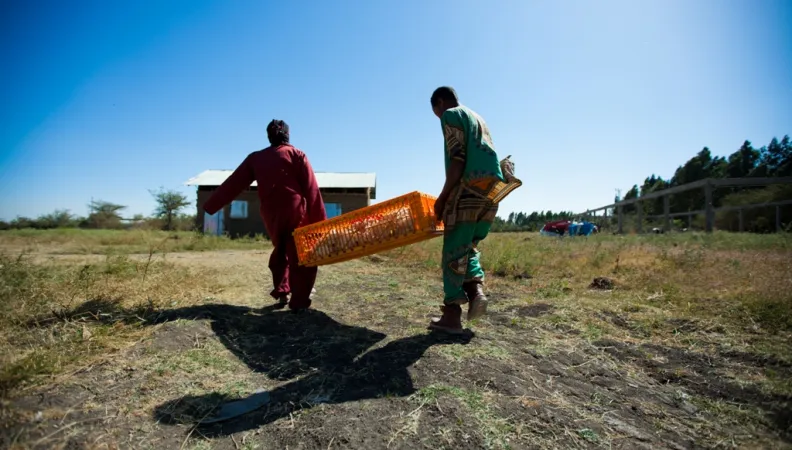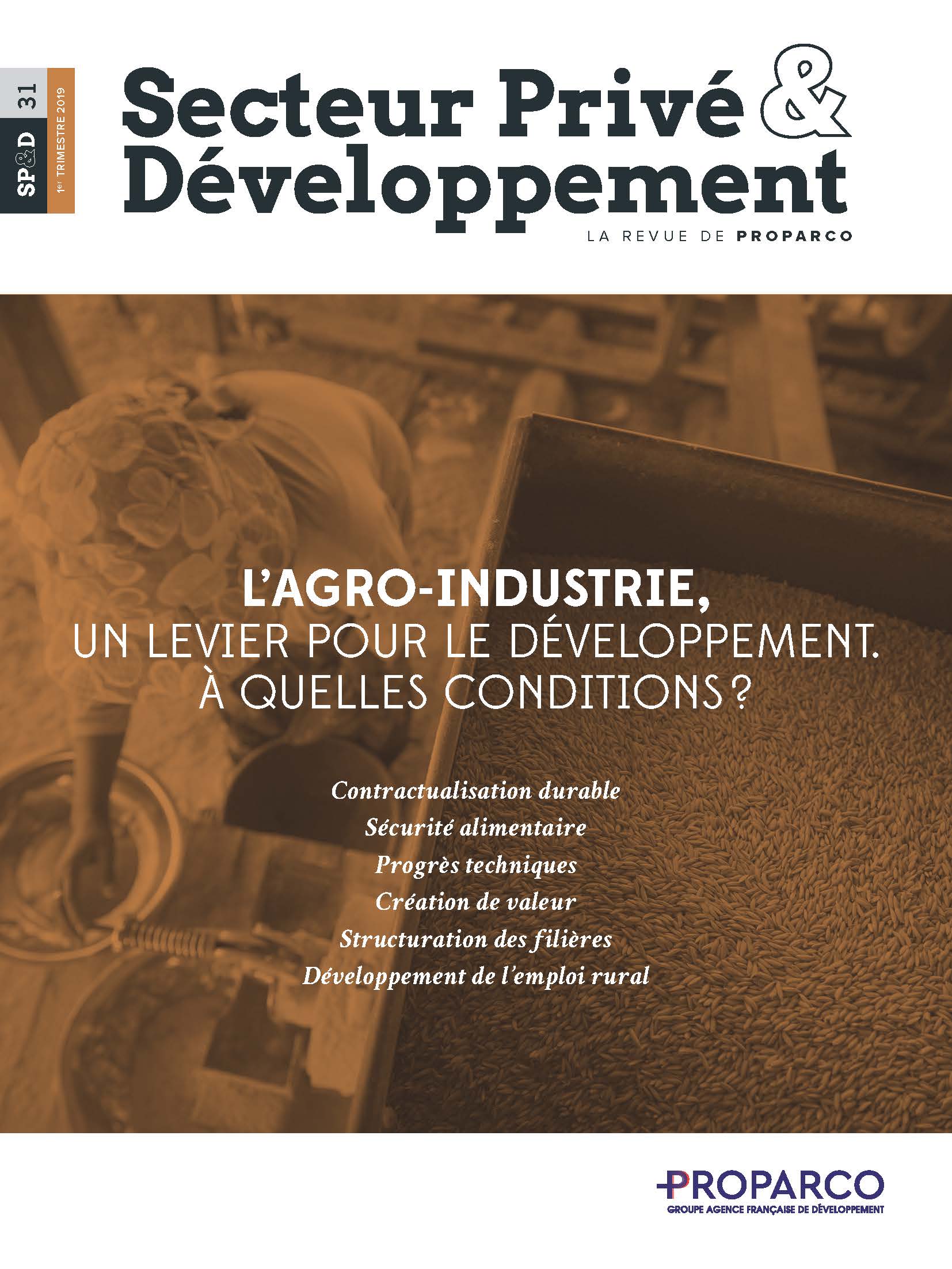Share the page
Complementarity between agro-industry and smallholders in Sub-Saharan Africa
Published on
Bertrand Vignes Director of the Natural Rubber Unit SIFCA


Private Sector & Development #31 - Scaling up the development impact of agro-industry
This issue of Private Sector & Development aims to demonstrate that the agro-industry, even if it sometimes brings up “negative externalities affecting the environment and small producers”, can be a major driver for development.
By providing jobs, technical assistance and development projects to village communities, industrial groups strengthen their economic and social well-being – and can complete their production with the production of smallholders. This complementarity is rooted in the Ivorian model, initiated by national companies and then embraced by SIFCA, and should be supported by lenders and governments, in particular through loans and tax measures.
The agricultural model adopted in Côte d’Ivoire for rubber, oil palm and cane sugar growing is based on the balance between industrial plantations outgrowers and smallholder plantations. Industrial plantations launch the activity, by providing in-house expertise and capacity building. With the help of research centres, they define the plant material and the plantation and farming techniques the most suited to the context. However, industrial groups generally also need the production of village growers to reach the critical size to allow them to justify or optimise processing plants. Consequently, they directly and actively support private growers: they train them, supply them with plant material and provide them with the necessary technical assistance. They sometimes rely on the government to facilitate the contractual relationship they establish with the growers (in Ghana, for example), or to formalise the technical assistance (as is the case with FIRCA in Côte d’Ivoire). Village and industrial plantations are therefore complementary.
The challenge of access to financing and regulatory mechanisms
Lenders have historically had a major impact on the creation of certain sectors by supporting, the first plantation projects, alongside agribusiness. Individual initiatives have mushroomed through a knock-on effect. This is particularly the case in Côte d’Ivoire for rubber, where the projects initially financed in the 1980s accounted for a few thousand hectares, while those which were subsequently directly handled by growers, account for several hundreds of thousands of hectares. With no access to financing, the very small growers cannot develop new surface areas nor increase their yields. Agribusinesses cannot singlehandedly provide this financing, especially in a context of growing competition and with no state supervision or regulation. Industrial groups cannot supply advances in kind (inputs, plant material) with future repayment by taking part of the production, if there is a risk that the latter will finally be delivered to a third party. Lenders, for their part, do not wish to bear the credit risk. In addition, as land titles are scarce in West Africa, the borrower is unable to provide guarantee. Today, while agribusiness needs financing facilities from lenders, it also needs regulatory and fiscal support from governments. For example, without strong fiscal incentives in Côte d’Ivoire, there will continue to be an insufficient number of industrial rubber processing facilities and the raw material will be exported to Asia – depriving the country of highly precious added value. Land reforms, such as those carried out in Côte d’Ivoire, are crucial for the development of village plantations: for example, by regularising informal situations, land can be used as collateral, in the event of borrowing.
Creating areas of sustainable prosperity
Industrial plantations – “areas of sustainable prosperity” – must bring about economic and social development for neighbouring communities. In return, having extensive crop areas requires helping the communities to also have access to sustainable prosperity.
SIFCA Group addresses all the subjects which incorporate decisively sustainable development, respecting the rights of communities: working and employment conditions in general, child labour in particular, resource- efficiency and agrochemical inputs, respect of land rights, stakeholder engagement, etc. For communities, the creation of direct and indirect jobs undeniably generates immediate social and economic benefits. However, in an African rural context, these benefits are not sufficient. They need to be combined with other positive impacts. Consequently, community development programmes relating to Corporate Social Responsibility (CSR) policies are essential. They make a significant contribution to improving access to education, health, or in creating local infrastructure. These programmes cannot, of course, singlehandedly guarantee the economic self-sufficiency of communities. Agribusiness must therefore contribute to local sustainable development by promoting smallholder production and offering it outlets – for example, by providing it with access to processing plants.
Finally, agribusinesses are often wrongly accused of only producing export crops. Whereas, in the case of SIFCA Group, one of its three activities is effectively based on a product intended for export (rubber for industry), whilst the other two (palm oil and sugar) are exclusively intended for the local food market. Moving towards food self-sufficiency is a tremendous challenge and notably within a context of rapid population growth.
Respecting environmental principles
Deforestation has become a major challenge for agribusinesses and their inter-branch organisations. SIFCA has made a public commitment to “Zero Deforestation” but this engagement cannot be confined solely to the group’s concessions. It is also essential to ensure that smallholders do not clear forests. For example, PALMCI and SAPH in Côte d’Ivoire and GREL in Ghana conduct communication and monitoring actions among growers. Michelin, which is concerned about the origin of its raw materials, has developed a barometer named “Rubberway” to assess compliance with the key principles of CSR in its supply chain. SAPH and GREL have adopted this system. But the surface areas that need to be covered and the number of stakeholders are considerable. While the increasing development of technological tools (geomatics, in particular) allows this requirement to be addressed more effectively, supporting and supervising growers in this field is a major challenge for the agribusiness sector. When there is no deforestation, the carbon footprint of perennial village crops (rubber, oil palm, cocoa) in humid tropical areas becomes positive. In the case of rubber, it is recognised that a hectare fixes an average of eight tons of CO2 a year. Furthermore, if we consider that natural rubber avoids the use of synthetic rubber from fossil fuels, the use of a ton of natural rubber generates a total gain of 17 tons of CO2. Consequently, for a hectare of rubber planted on fallow land producing 1.5 tons per hectare a year, a grower avoids the emission of some 25 tons of CO2 a year. Solutions are under preparation to develop the biomass generated at the end of the plantation cycle. SIFCA Group owns a palm oil refinery (SANIA in Côte d’Ivoire) which is energy self-sufficient thanks to the rubberwood chips from SAPH. On a larger scale, the BIOKALA project, currently under development by SIFCA and EDF, is based on the construction of a thermal power plant which will be supplied by palm waste (end-of-life palms and trunks). Finally, in the case of rubber, it involves exploiting the end-of-life wood to produce construction lumber, replacing forestry resources. These development options are also opportunities for growers (the biomass or construction lumber is bought from them), which will, for example, allow an old plot to be renewed.
Exporting the Ivorian model
The model based on the complementarity of industrial and village plantations, has worked in Côte d’Ivoire, and could be exported within the subregion. The development of rubber outgrowing in Ghana is the result of coordination between three key players: the government, the industrial company (GREL) and the lender (AFD). If the approach has been a success, it is also due to the fact that there have been no competing processors in the area: the delivery of the village production, and the repayment of loans, was guaranteed. Today, this model is undermined by the export of raw materials to Asia, which the government has not yet regulated. The performance of agribusiness becomes even more effective (and therefore so does the regional impact) when it is on a larger-scale. The scale effect is essential. Processing plants need to be large enough to ensure a reliable and competitive industrial process, compatible with market requirements. Furthermore, there is a critical size which allows new production areas to be created by using the existing internal resources and expertise. This is, for example, the case with SIFCA Group, which uses its structures in Côte d’Ivoire to gradually develop in Liberia, in oil palm and rubber plantations. But beyond Liberia, a number of other African countries have major development potential. It is therefore possible to apply the Ivorian model to a number of contexts. Various examples show that responsible agribusiness provides and promotes extensive agricultural smallholders’ development. We are thus convinced that in order to improve the standard of living in the Sub-Saharan region, as well as curb rural exodus and emigration, one must support local development.
1 For example, the 150,000 hectares of oil palm village plantations in Côte d’Ivoire could undoubtedly double their yield if loans were available for growers.
2 Which concerns the collection, processing and dissemination of geographical data.

